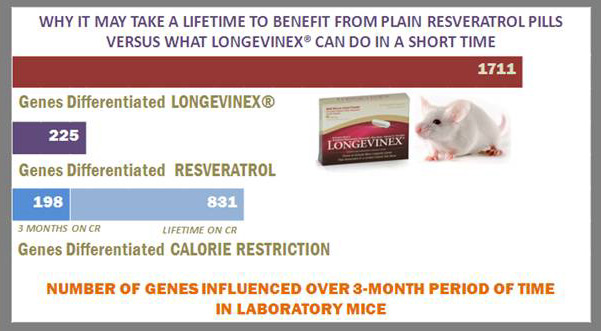ResveratrolConsumer
avert online
consumer fraud
ResveratrolQuiz
test your knowledge
New E-Book
How the world got lost on
the road to an anti-aging pill
Subscribe to our newsletter to receive email notifications when new articles are posted.
April 9, 2013: by Bill Sardi
European researchers report high-dose pure synthetic resveratrol produced no measurable benefit among healthy obese males over a 4-week trial. It may be another nail in the coffin for resveratrol, but health journalist and resveratrol-pill formulator Bill Sardi says he thinks he knows why the study was a flop.
Certainly the world has been waiting for resveratrol to live up to its promise as a molecular mimic of a limited calorie diet. In the animal laboratory, 40-50% reduction of calorie intake among warm-blood mammals about doubles their healthy lifespan. Could this happen for humans? The science has been mixed so far. Sardi says he knows why.
For one thing you can’t take healthy people and anticipate their pre-disease numbers to improve appreciably. Often the measures modern medicine uses are not linked to improved outcomes or longer life. For example, cholesterol is one measure of health that has never been shown to parallel mortality rates, says Sardi.
You have to measure true markers of aging, such as iron storage (ferritin), accumulation of cellular debris (lipofuscin), mitochondrial function, red blood cell width and labile iron, none which were measured in the recent study says Sardi.
He says another problem is that mega-dose resveratrol works in a contrary manner to elevate stress hormones, worsen pre-disease states and negate the full benefit achieved when a mild biological stress agent activates internal antioxidants via a phenomenon known as hormesis. Sardi says mega-dose resveratrol runs contrary to what has been learned from wine drinking and laboratory studies.
This negative study, published in the journal DIABETES, cites a similar study where far less resveratrol (150 mg) used in this study (500 mg) was employed among a similar group of subjects over the same time period with successful results. Numerous studies point to lower doses mimicking a calorie restricted diet, not mega-dose resveratrol, says Sardi. “One would think researchers are intentionally trying to put the scientific kibosh on resveratrol,” he says.
The biggest oversight in evaluating these studies is that it takes a lifetime for a calorie-restricted diet to fully activate a vast number of longevity genes. This was conclusively shown in a study with calorie restricted mice.
In the short-term (12 weeks), calorie-restricted diet activated 198 genes, but over the animal’s lifetime this diet activated 831 genes and took full effect.
In that same experiment, relatively low-dose resveratrol (equal to 100 milligrams in a 160-lb human) activated just 225 genes in the short-term. If this experiment translates to humans, it would take life-long resveratrol supplementation to fully activate all of the longevity genes activated by a long-term limited calorie diet.
But remarkably, when a matrix of small natural molecules (Longevinex®) was combined with resveratrol, 1711 genes were activated over the short-term — double that of life-long calorie restriction and 7-times that of short-term resveratrol.
More precisely, the combination of natural molecules (Longevinex®) switched 677 of 831 (81.4%) longevity genes in the same direction as a calorie-restricted diet. This is the closest mimic to a limited calorie diet ever demonstrated.
Longevity seekers may have to adhere to life-long use of resveratrol to achieve the same effect as calorie restriction, something that Longevinex® exceeded in just a few weeks. If this is true, most resveratrol pill users are wasting their money.

Posted in Resveratrol
Add comments »